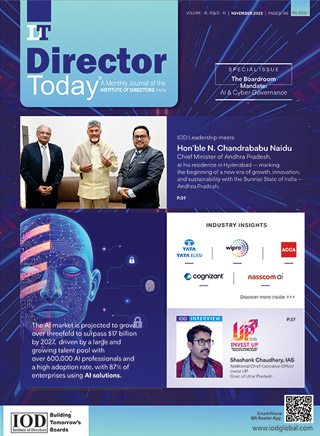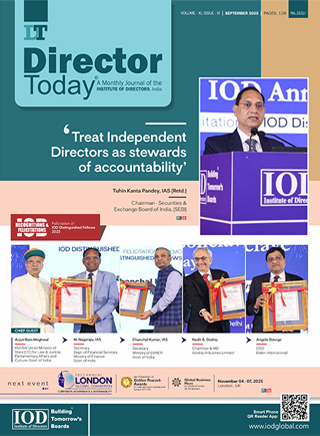Director Independence and Family-Run Enterprises: Goals and Application

Ask any governance professional for an indicator of board effectiveness, and most will point quickly to 'director independence'. Governments and regulators around the world tend to agree, as it is a concept often at the forefront of governance codes and handbooks. In India, the concept first appeared in the Confederation of Indian Industry's 1998 Desirable Corporate Governance Code and has been further elaborated upon in the years since. Director independence brings credibility to board activities as it indicates a presence of objective external viewpoints, scrutiny and constructive challenge.
The focus of governance rules in this area is often on the proportion of 'independent directors' on the board as a means to ensure the presence of independent voices. That is a tangible and measurable reference point but must be predicated in an equally tangible definition of what an 'independent director' actually is. Typically, this means an individual with no working, pecuniary or interpersonal relationship with the organisation and its key people.
But when we at Nasdaq Governance Solutions assess board performance, we focus on the goal (and benefit) of director independence rather than only its quantification. This goal is 'independence of mind.' The presence of independent directors is a strong indicator and indeed enabler of that goal, and individuals meeting the definition of 'independent director' are logically best placed to demonstrate independence. However, that responsibility neither rests solely with them nor is it guaranteed that independent directors are always able to meet that expectation.
When it comes to family-owned and family-run organisations, it is important to accept the specific ownership and leadership dynamic whilst also seeking to cultivate independence of mind.
So how do strong boards embed the benefits of director independence, and what does this mean for family-owned or family-run businesses?
An important baseline for any governance framework is pragmatism align to good governance principles, but apply in a way that matches the size, nature and complexity of the organisation. The 'gold standard' should be understood, but it isn't always necessary to apply like for like.
It is the same with director independence – the 'gold standard' of having majority independent directors on the board may not be practicable for, say, family-owned or family-run enterprises given that ownership dynamic. But some presence of independent directors is undeniably beneficial, and diligent boards pay attention to how to maximise the benefit of those individuals by amplifying and directing their voices where they can add the most value. They also seek to foster independent thought in all those around the board table.
When it comes to family-owned and family-run organisations, it is important to accept the specific ownership and leadership dynamic whilst also seeking to cultivate independence of mind recognising the benefits that degrees of independence can bring.
Elevation
In practice, 'elevation' means elevating any independent directors by giving them key roles such as Chair of the Board or Chair of board level committees; by enabling them through specific responsibilities, such as acting as 'champion' for certain stakeholder groups or key board topics such as governance, and by giving them appropriate access to management alongside both internal and external subject matter experts. These responsibilities and privileges help to germinate independent thought at the board and elsewhere.
Protection
'Protection' also means thinking how to 'protect' those voices by implementing controls such as robust conflicts of interest identification and monitoring; a transparent remuneration framework; and appointment and nominations procedures that are inclusive of independent director involvement. This type of measure plays an important part in sustaining independent thought and demonstrating to stakeholders a diligent approach to oversight and supervision.
Direction
Finally, 'direction' means fostering a dynamic and culture in the boardroom that empowers all directors and attendees to demonstrate independence of mind. The board Chair plays a key role in inspiring expression of individual perspectives; encouraging balanced input from around the table; and being conscious of potential biases amongst sub groups of directors or domination of discussion by certain personalities. Directors can further benefit from being enabled to build relationships outside of the boardroom, gaining additional insights and building credibility and influence. Board cultures within which directors feel genuinely empowered to express personal or contrary perspectives are often those that best demonstrate director independence from meeting to meeting.
This is where we really start talking about impact and efficacy – when board and governance frameworks are robust and thoughtful enough to ensure organisations are benefiting from their independent directors as much as possible and when independence of mind is enshrined in ways of working. In particular, external directors really are an investment in that sense, and all stakeholders should feel the benefit from maximised returns.
By applying these principles in proportion, family-owned and family-run organisations propagate the benefits of independence and objectivity in the boardroom in line with their needs and priorities. The key is focusing on the value that independence in the boardroom brings to decision making, rather than taking a purely compliance-led approach of 'ticking the independent director' box. Board discussions and decisions benefit from a breadth of views – it is up to each organisation to harness the potential.
Author

Mr. James Beasley
He is Head of Board Advisory for Europe, Middle East and Africa at Nasdaq. He is a governance and board effectiveness specialist with over 14 years of experience working with some of the world's leading organisations.
Owned by: Institute of Directors, India
Disclaimer: The opinions expressed in the articles/ stories are the personal opinions of the author. IOD/ Editor is not responsible for the accuracy, completeness, suitability, or validity of any information in those articles. The information, facts or opinions expressed in the articles/ speeches do not reflect the views of IOD/ Editor and IOD/ Editor does not assume any responsibility or liability for the same.

 Quick Links
Quick Links
 Connect us
Connect us




 Back to Home
Back to Home































